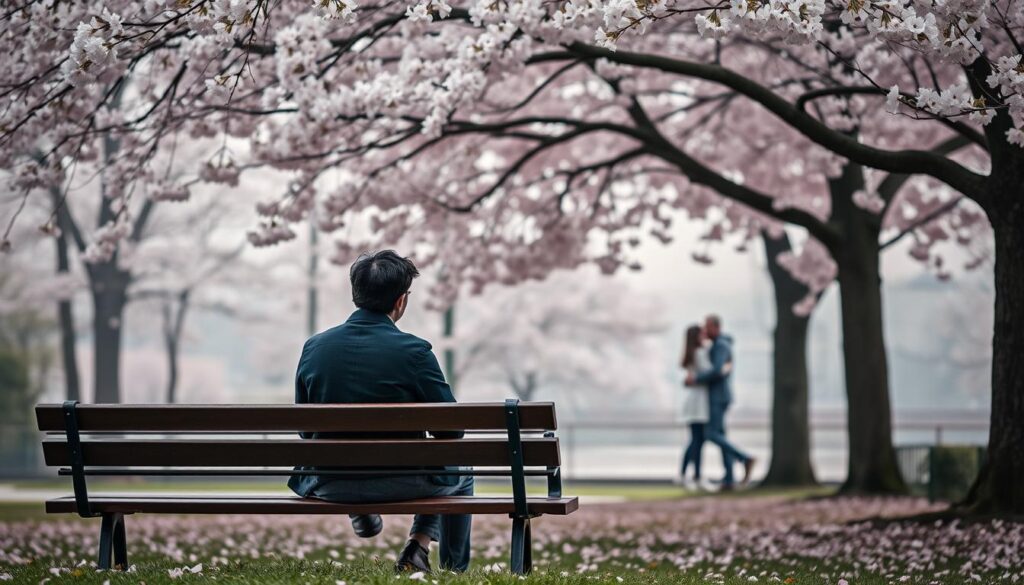Unrequited love can be very painful. People often feel deep emotional longing. These feelings come from loving someone who doesn’t love them back.
For many, the pain of loving in secret is a big part of their feelings. We want to look into these hidden desires. We aim to understand the deep pain of loving without being loved back.
Understanding Unrequited Love
Feeling unreturned affection can be really tough. It can really affect how you feel about yourself. Knowing what unrequited love is can help you deal with these hard feelings.
Definition and Characteristics
Unrequited love means you love someone who doesn’t love you back. It’s when you feel a strong connection but the other person doesn’t. This can make you feel left out and sad.
Common Signs and Symptoms
Knowing the signs of unrequited love is key. You might always want to be with the person, feel sad, or have trouble moving on. These signs show it’s a one-way feeling and highlight the need to see if the other person is emotionally available.
Why We Experience Silent Yearnings
Unrequited love fills our lives with silent yearnings and desires. These feelings come from many psychological and social factors. They shape our emotions and what we expect from love.
Psychological Factors
At the core of unrequited love is the psychology of love and attraction. Our brains seek connection, leading to deep, one-sided feelings. Past experiences and insecurities make these feelings even harder to deal with.
Social Influences
Societal views on romance greatly affect our love desires. From a young age, we see media and cultural stories about love. These norms shape our expectations and actions in love.
The need to meet these ideals can lead to silent longings. When our experiences don’t match these ideals, it’s tough. Society also makes us think unreturned love is a step to true love. This makes understanding and accepting unrequited feelings harder.
The Role of Unspoken Desires in Relationships
Unacknowledged feelings can greatly affect relationships. When people hide their emotions, problems can arise. This can lead to misunderstandings and strained relationships.
Secret feelings can cause trouble in many ways. For instance, someone might feel stuck with unreturned emotions. This makes it hard to talk openly and honestly.
Being open is key in any relationship. Talking about hidden feelings can strengthen bonds. Yet, many are scared to share their feelings, fearing rejection. Still, being brave enough to talk openly can make a relationship better and more fulfilling.
Silent Yearnings: Unspoken Desires in Unrequited Love
The quiet ache of unrequited love often goes unnoticed but resonates deeply within those experiencing it. These heartache narratives reflect the profound emotional toll of unreturned affection. It influences both mental and physical health in significant ways.
Personal Stories of Unrequited Love
People like Selena Gomez and Emma Watson have shared their experiences with unrequited love. They show the universal pain of one-sided love. Selena talked about her long feelings for Justin Bieber, which weren’t always returned. Emma Watson shared a childhood crush on Tom Felton that wasn’t mutual.

Emotional and Physical Impact
The effects of one-sided love can show in many ways, like constant stress and mood swings. The emotional toll includes feelings of inadequacy, loneliness, and deep sadness. Physical symptoms like insomnia, headaches, and decreased appetite also show the impact.
Coping with Unspoken Desires
Unrequited love can be tough, making you feel helpless and sad. The first step is to accept your feelings. It’s okay to feel this way. Acceptance is key to healing.
Self-care is a great way to build emotional strength. Take care of your body and mind. Try exercising, meditating, or enjoying nature. These activities can lift your mood.
Having a strong support system is also important. Be around people who listen and support you. Talking to someone you trust can help a lot.
Improving yourself can also be empowering. Set new goals or try something new. This helps you move past one-sided love and feel better about yourself.
Finally, stay positive and mindful. It’s easy to get caught up in negative thoughts. But focusing on the positive can help you manage your feelings. Writing down your thoughts can help you process and grow.
The Impact of Culture on Unrequited Love
Unrequited love is a common theme worldwide. It shows up differently in different cultures. Looking at Western and Eastern views helps us see how culture affects our feelings about love.
Western vs. Eastern Perspectives
In Western cultures, love is often seen as personal and about happiness. Media and books show unrequited love as a noble but sad journey. They focus on finding happiness and growing from heartache.
In Eastern cultures, love is more about group harmony. Stories from Japan and China show love as a duty and sacrifice. They stress keeping peace in families and communities over personal happiness.
Media and Literature
Media and books in the West make unrequited love dramatic. They show the emotional struggles and growth of characters. Classics like Shakespeare’s sonnets and modern novels shape our views on love.
In the East, stories are more subtle. Japanese haiku and Korean dramas show quiet longing. They highlight the beauty of unspoken love, showing different views on relationships.
By looking at how love is shown in media and books, we see how cultures view love. It shows us the many ways unrequited love is felt and shared around the world.
How to Identify Unrequited Love Early On
It’s hard to know if someone loves you back, especially if you really care about them. But knowing the signs early can prevent a lot of pain. A big sign is if the person seems far away and doesn’t respond to you much.
Also, watch if they don’t talk back to you as much as you talk to them. If you always start conversations and plans, but they don’t, it’s a sign. Look at their body language too. It can tell you a lot about how they really feel.
Spotting unreturned feelings also means paying attention to how they react to your love. If they seem uncomfortable or ignore your affection, it might mean they don’t feel the same. Knowing these small signs can help you deal with the situation and keep your heart safe.
Effective Communication Strategies
Talking openly about love is key when dealing with unrequited love. It helps you share your feelings and keep your personal space safe. Finding the right balance between talking about love and setting boundaries is important for your emotional health.

Expressing Your Feelings
It’s important to express love in a healthy way. Start by understanding and then sharing your feelings clearly and with respect. Choose a private and calm place for this talk.
Being honest and open is important. But also think about how the other person might feel. This way, you respect their feelings too.
Maintaining Boundaries
Setting emotional boundaries is crucial to protect yourself from more pain. Clearly tell others what you’re okay with. This helps manage your feelings and stress.
Remember, it’s about balancing your well-being with showing love to others. This way, you stay healthy and happy.
Building Self-Esteem Despite Rejection
Being rejected in love can really hurt your self-worth and confidence. But, it’s key to remember that rejection doesn’t mean you’re not valuable. Start by letting yourself feel your emotions fully. Knowing these feelings are normal and don’t define your worth is freeing.
Positive self-talk is a great way to boost your self-esteem. Tell yourself about your strengths and what makes you special. Thinking about your past successes and what you offer in life helps you see yourself more positively. Also, being around supportive friends and doing things you love can help you feel better.
Using rejection as a chance to grow is important. Learn more about yourself and try new things. Setting and working towards personal goals gives you a sense of purpose. Seeing each experience, including rejection, as a part of your growth is key.
Practicing gratitude is also helpful. Focusing on the good things in your life can change your outlook. Writing down things you’re thankful for can make you more positive and resilient.
Adding mindfulness and self-care to your daily routine helps too. Activities like meditation, journaling, and exercise can reduce stress and boost your self-esteem. Remember, rebuilding your self-worth takes time, patience, and kindness to yourself. With effort, you’ll become stronger and more confident.
The Benefits of Moving On
Realizing the benefits of moving on is key to overcoming unrequited love. It opens the door to a brighter, more fulfilling future. These steps bring emotional closure, which is vital for growth.
Finding Closure
Finding closure is crucial for emotional health. It lets you process your feelings and understand your experiences. This helps you release emotional weight and build a strong base for future relationships.
Personal Growth
Another great benefit is personal growth. This journey helps you understand yourself better. It boosts your self-esteem and prepares you for stronger relationships in the future.
When to Seek Professional Help
Unrequited love can deeply affect your mental and emotional health. Many people handle these feelings alone. But, knowing when to get help is key for your emotional well-being.
If feelings of rejection and sadness start to affect your daily life, it’s time to think about therapy. Signs like constant sadness, anxiety, or trouble focusing are warning signs. Also, if unrequited love causes physical issues like changes in appetite or sleep, or if you start having depressive thoughts, see a mental health expert.
Also, if you’re having trouble dealing with these feelings, counseling can help. Counselors offer a safe place to talk about your emotions. They help you find ways to deal with and move past the pain of unrequited love.
There’s no shame in asking for help. It’s a step towards healing and taking back control of your emotions. If unrequited love is taking over your thoughts and affecting your life, seeking help is a big step towards happiness and balance.
The Role of Therapy in Dealing with Unspoken Desires
Unrequited love can make us feel many confusing emotions. Therapy helps sort out these feelings, leading to healing and strength. It offers different ways to find peace and clarity.
Types of Therapy
There are many therapies that can help with unspoken desires. Cognitive Behavioral Therapy (CBT) changes negative thoughts. Psychodynamic Therapy looks at past issues that affect us now.
Humanistic Therapy helps us discover ourselves. It’s a safe place to explore our feelings.
Benefits of Counseling
Counseling does more than just ease pain. It helps us learn to cope better and communicate well. We also understand our needs and desires more.
This support leads to lasting healing. It makes us stronger and more confident in facing future challenges.



